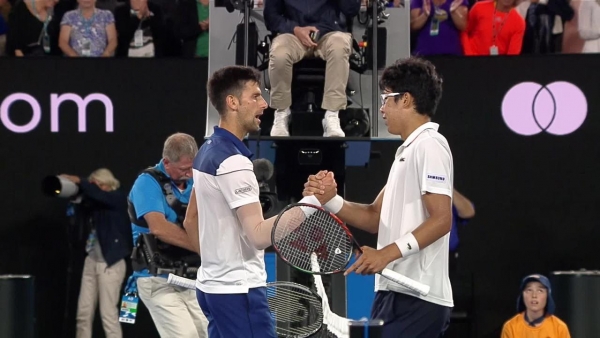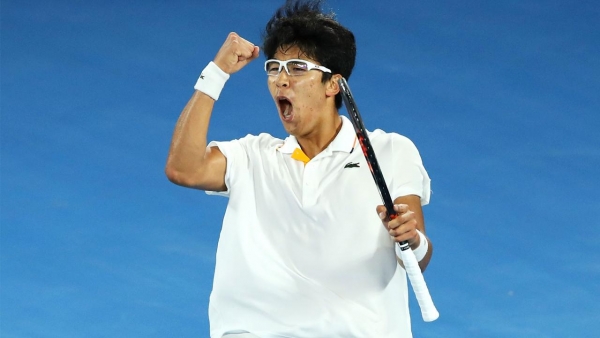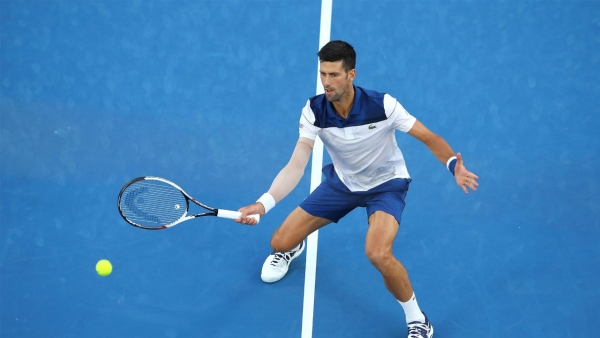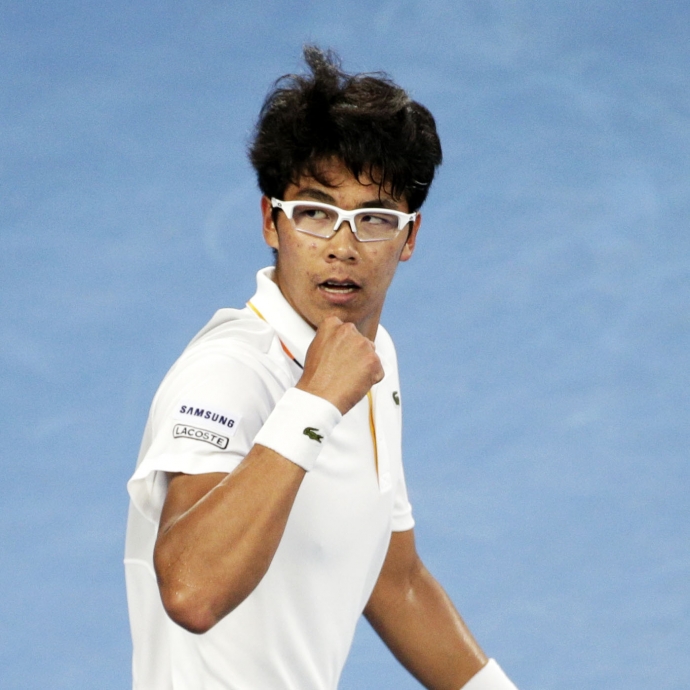Brilliant, bespectacled Hyeon Chung is already used to racking up tennis firsts in his native South Korea – a nation where clubbing a small, yellow ball for a living is virtually non-existent.
It was only by virtue of a trip to the doctor as a six-year-old that he even stuck with the sport, where it was recommended watching that small, yellow ball would help his poor eyesight.
Sporting his usual white frames on Sunday night, the 21-year-old notched his most impressive first yet – as the first South Korean to reach a Grand Slam quarterfinal after his elimination of six-time Australian Open champion Novak Djokovic.
The youngest man in the draw had already claimed bragging rights with a stunning upset of No.4 seed and fellow young gun Alexander Zverev in a five-set third round.
This victory, over the former No.1 on a comeback from six months out of the game, was more emphatic.
The 7-6(4) 7-5 7-6(3) upset of his childhood idol pits him into the most unlikely of quarterfinal clashes with world No.97 Tennys Sandgren, who eliminated No.5 seed Dominic Thiem in five sets.
“Today, victory for my country, I think tennis [is] coming up after this tonight,” Chung grinned.
“I'm just looking for Novak, Roger [Federer], Rafa [Nadal]. They're all my role model, my idol.
“I'm just happy to play with Novak again. I'm just honoured to see him again on the tour. Today my dreams come true.”
In each of the three sets against Djokovic, it was the South Korean who burst out of the blocks with the break in hand, only to be reeled in as the Serb’s screeching splits turned defence into offence time and again.
While that rubber-band-like athleticism has helped Djokovic dominate more than any other at Melbourne Park over the years, Chung was more than comfortable matching his side-split retrievals and baseline bludgeoning to eke the opening two sets.
Not since the fourth round in 2007, when the Australian Open was played on green Rebound Ace courts, had Djokovic dropped the opening two sets.
That was against Roger Federer and on that day, too, he would fall in straight sets.
For all Chung’s brilliance and composure in closing out each set after the letdown of letting early leads whittle away, this straight-sets defeat was in far different circumstances for Djokovic than his 2007 dismissal.
Then he was a rising talent, yet to reach his first Grand Slam semifinal. This time he was a 12-time major champion putting a suspect, sleeved right arm to the test after the injury ended last season at Wimbledon.
“Unfortunately, it's not great,” Djokovic said of his elbow. “Kind of end of the first set it started hurting more. So, yeah, I had to deal with it till the end of the match.”
When Chung looked to have taken a stranglehold on proceedings, leading a set and 3-1 in the third, Djokovic was still hitting the ball well enough to deliver a timely reminder of his Melbourne Park credentials when he pulled off the point of the match with a lunging low forehand volley winner on his way to pegging back the break.
Lifting his arms to rouse the Rod Laver Arena crowd’s desire for a fourth set, Djokovic slid, scraped and screeched desperately, only to shoot a look of exasperation the way of his entourage as his 21-year-old opponent held for 5-4.
Djokovic had come to a sobering realisation as the pair entered a third-set tiebreak. Chung was not tightening up with the finish line in sight, and the Serb’s usual brick-wall defence wasn’t going to cut it.
If a six-time champion was going down, he would go down swinging.
On the full stretch the South Korean pulled off a rolling forehand pass on the slide, and was handed three match points off a Djokovic forehand error.
When the Serb ripped one final backhand wide, there was no wild celebration from the 21-year-old.
Humble and composed, he simply stood and stared in his entourage’s direction. He had felled his idol, and he’s here for the long haul.
“I think I saw him [for the] first time when he make champion in Melbourne, in Australian Open, like almost 10 years ago,” Chung said of Djokovic. “When I’m young, I’m trying to copy Novak because he’s my idol.”
For the first time this tournament, he will go into a match where he is expected to win on Wednesday.
Another tennis first for his nation beckons.
And a generation of South Korean children is already beginning to copy this new idol.



